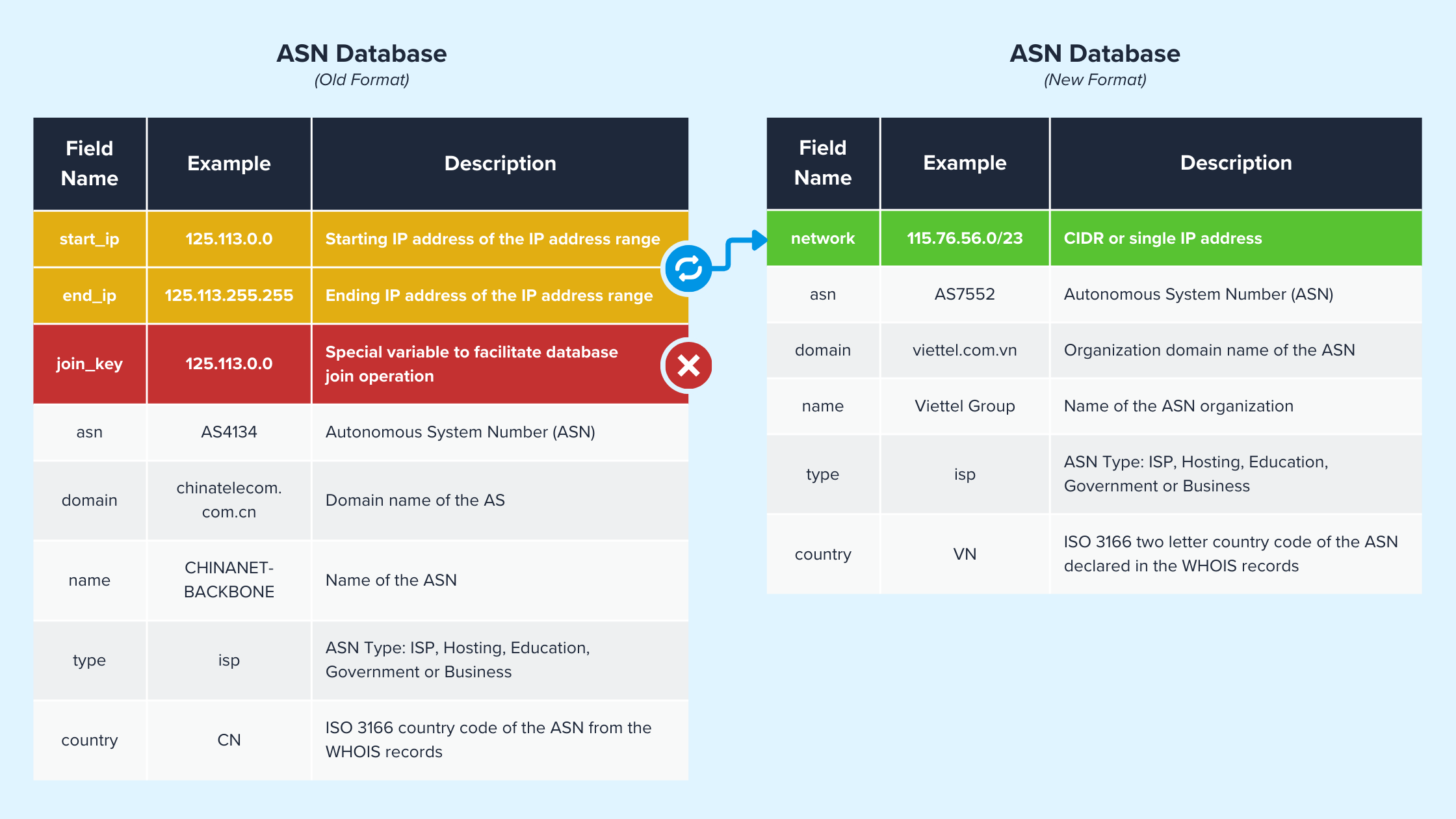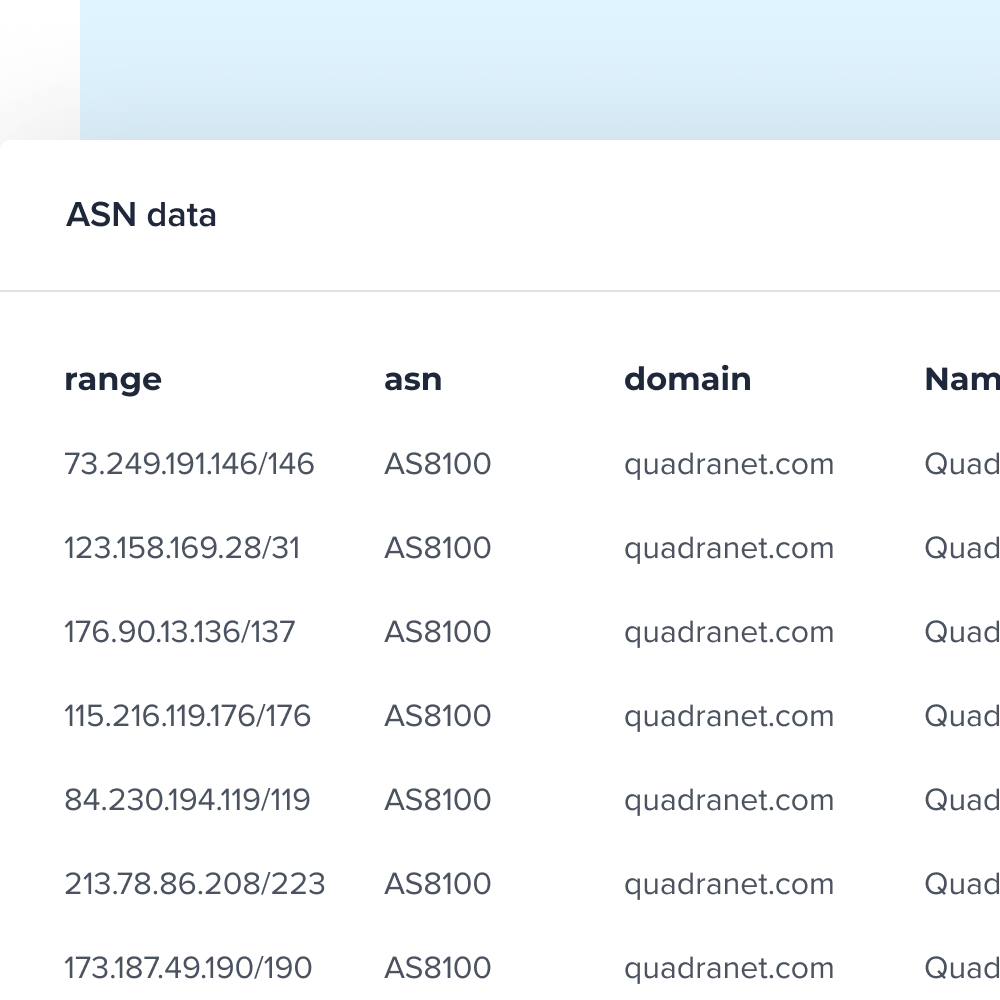 My IP ↗or
My IP ↗orAt IPinfo, we’ve been providing IP data solutions for over a decade—helping businesses, security teams, and developers quickly identify, categorize, and leverage IP address information. As the needs of our customers evolve and platforms become more advanced, we continuously improve how our data is delivered.
Today, we’re excited to announce CIDR-based IP database downloads as our new default. This change makes it simpler to integrate with modern networking, security, and data tools—ultimately saving you time and improving workflows.
CIDR vs IP Range
Classless Inter-Domain Routing (CIDR) is a method for organizing IP addresses and defining IP address blocks using a combination of an IP address and a prefix length. The prefix length specifies the number of bits that make up the network portion of the address.
This is different from how we used to show IP addresses based on IP range. An IP range defines a block of IP addresses by specifying a start IP and an end IP.
CIDR is a more efficient way to define IP address blocks compared to traditional IP range methods. Here’s how they compare:
Key Benefits of Our CIDR-Based IP Database Downloads
By switching to CIDR-based columns and removing the join_key, we’ve streamlined our IP database downloads, making them easier to use and more compatible with modern data platforms.
- Simplified Representation: CIDR notation consolidates start and end IP addresses into one concise format. For example, 192.168.1.0/24 represents 256 addresses, making it more concise than specifying a start and end IP range.
- Seamless Integrations: Popular networking tools, firewalls, data platforms and access control lists (ACLs) directly support CIDR-based lookups, reducing setup time.
- Easier Calculations: CIDR simplifies calculations for the total number of addresses and subnets.
- Improved Accuracy: CIDR reduces the risk of overlaps or errors in IP allocations by tracking prefixes.
- Reduced Complexity: With fewer columns (only one network column instead of start, end, and join_key), you can more easily query and manage your data.
- Future-Ready: Most modern databases and platforms natively support CIDR data types, ensuring long-term compatibility.
Why We’re Switching to Network-Based Columns
IP database downloads present a unique challenge as index columns are IP addresses. Searching for an IP address within a range requires complex joins spanning thousands (IPv4) to millions (IPv6) of values. When launching our IP database downloads initially, we had to create a unique approach to improve adaptation, focusing on the simplicity of having just three columns in the data platform:
- start_ip: Starting IP address of the range
- end_ip: Ending IP address of the range
- join_key: A special IP address variable to facilitate faster join/lookup operation
This structure helped us build integrations, such as our Snowflake platform data, and utilize our data that did not have robust IP address data type support.
However, due to better support for IP address types in data platforms, our customers' needs, and our ability to support multiple database download file versions for each access token, we decided it was the right time to change the database schema of our IP database downloads.
Instead of having three different index columns to support IP addresses, we are opting for a single column, network CIDR-based IP range column.
What Has Changed
✔ Network column replaces IP range columns (start_ip and end_ip)
✔ Join_key removed – Reduces unnecessary complexity in data queries
✔ Single IPs remain single values (not /32 or /128) – Ensures compatibility with networking tools
✔ New columns introduced – See our documentation for details

We are slowly rolling out the network/CIDR based on all our IP database downloads as the default downloads. Currently, it is the default download for several different IP database downloads.
The network column has two features.
The IP address range containing two or more IP addresses contains the value in a CIDR format.
But in the case where the IP address range only contains one IP address, we have opted to have the IP address as a single IP address value instead of a slash notation of /32 for IPv4 (e.g., 192.168.1.1/32) and /128 for IPv6 (e.g., 2001:db8::/128). Networking tools, security software, and popular data platforms can identify individual IP addresses within a CIDR column with no issue.
We have also introduced a few new columns for several of our databases. I highly recommend that you check out our documentation for details.
Rollout Plan and Your Options
This update has been planned for months, and we know we need to avoid any disruptions or even minor inconveniences as we release the new database updates.
- Existing Users: You’ll continue to receive the same IP range-based download unless you request switching to our new CIDR-based format. No action is required if you prefer to keep your current setup.
- New Users: By default, new accounts will receive the CIDR-based downloads, ensuring they benefit from improved integration right from the start.
- Easy Opt-In: If you’re an existing user who wants to switch, just contact our team to update your cloud bucket URI. We’ll handle the rest.
We still retain our website's old database schema documentation to support our existing customers and users.
Why We Changed the Schema
We made this change because our users needed a format that integrates seamlessly with modern networking, security, and data platforms. CIDR is the industry standard for firewall configurations, security rules, and IP address management, making our data even more useful.
CIDR/network information is widely used in firewall operations to declare allowlists (also known as whitelists) and blocklists. The IP range-style columns need to be converted to CIDR format to use this software.
The join_key is not an intuitive IP address column. We recognize the fact that the utility of the join_key is quite a niche. We recommend users use the MMDB file format for rapid and super-fast IP data query operations. Even with join_key and indexing, no data platform or software can match the speed and ease of use of the MMDB file format. Moreover, database software and data platforms like Postgres, Clickhouse, etc., already support CIDR-based lookup operations and do not need the help of join_key. Also, for our data platform integrations like Snowflake, Google Cloud Platform (GCP), etc., we are moving towards an MMDB-based solution.
In the past, we have recommended that our users use our CLI's "range2cidr" command to convert range-based data downloads to CIDR-based data downloads. However, this operation involves first downloading the CLI and running the command, which is time-consuming. We usually address this issue by delivering our CIDR-based data downloads as a custom download, but we cannot support this for our free database. Major open-source security and firewall projects requested that we support native CIDR-based data downloads, so we invested in making the change.
Our Commitment to Better Data Access
As a data company, we are conscious of two things: the quality of the data and how easy it is to use our data. When we introduced the IP ranges based data downloads (start_ip, end_ip), it was out of necessity as many data platforms did not have the facility to support this data format. We know and recognize the need for network-based or CIDR-based data downloads, and we finally decided to commit to it based on the user need and maturity of different platforms.
As technology evolves, we’ll continue to refine our data formats to provide the best possible experience for our customers.
What’s Next?
- Explore Our Documentation: Check out the latest guides and best practices for working with CIDR in our Documentation Portal.
- Stay Tuned: More features and integrations are on the way to further streamline how you utilize IP data within your infrastructure.
Get the New CIDR-Based Format
Interested in upgrading your current downloads? Reach out to our customer service.
About the author

Abdullah leads the IPinfo internet data community and he also works on expanding IPinfo’s probe network of servers across the globe.

